Belgium-based SWIFT, the global financial messaging network, is taking a significant step into blockchain. The 50-year-old institution, often seen as the backbone of international banking, is partnering with over 30 global financial institutions, including African banks like Absa and FirstRand, to build a blockchain-based shared digital ledger to transform cross-border payments.
For decades, SWIFT has powered trillions of dollars in international transfers daily. Yet, its system has long been criticised for being slow, costly, and dependent on intermediaries.
In Sub-Saharan Africa, where remittance fees can average 8.45 per cent and sometimes reach 30 per cent between neighbouring countries, the pain of those inefficiencies is especially sharp.
First phase targets real-time global payments
Now, SWIFT says it’s working “at pace” on an upgrade that could make global payments instantaneous and available 24/7. The project’s first phase will focus on enabling real-time settlement, a significant improvement over the current system, where cross-border transactions can take one to four days to clear.
According to SWIFT, the new blockchain-based system will act as a shared digital ledger, “a secure real-time log of transactions between banks,” that can “record, sequence and validate transactions and enforce rules through smart contracts. ”
It’s a network where banks can transact directly and transparently, without passing through multiple intermediaries.
That’s a big deal for Africa. Africa’s cross-border payments remain among the most expensive and fragmented worldwide. The average fee to send $200 across African borders is the highest globally, partly because transactions must hop through several correspondent banks before reaching their destination.
By adopting blockchain, the global financial network hopes to streamline transactions, allowing African banks to settle payments more efficiently and at lower costs.
This shift could help regional trade blocs like the African Continental Free Trade Area (AfCFTA) achieve smoother financial integration, something the current patchwork of banking systems has made difficult.
The initiative also signals their broader move toward digital interoperability. Beyond traditional currencies, the network is testing ways to integrate stablecoins, tokenised deposits, and central bank digital currencies (CBDCs) into its infrastructure.
They could bridge traditional finance and the emerging digital money ecosystem if successful.
SWIFT links over 11,500 financial institutions
The company’s advantage lies in scale, with more than 11,500 financial institutions in over 200 countries already on its network. Its blockchain initiative isn’t just another pilot; it’s a potential turning point for how money moves globally.
There’s no fixed launch date yet, but the organisation insists it’s moving fast. For African banks struggling with high fees, liquidity delays, and regulatory friction, this new system could represent more than just a technical upgrade — it could be the foundation for a faster, fairer, and more connected financial future.
Because of this expansive network, the new blockchain system could change how money moves worldwide.












